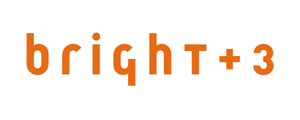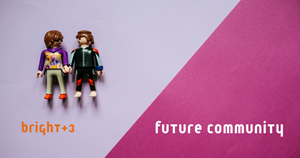👋 Welcome to Future Community.
This week feels like it's been nothing but a cake made of chaos with a chewy havoc filling. All covered in an icing of confusion and disarray. You're not alone if you're feeling a little exhausted and adrift.
Onto the more uplifting stuff! First, a shout out new folks from places like New Mexico, Texas, Colorado, Ohio, New York and Virginia. Thanks for being here!
From Chaos to Calm. Perhaps.
On Tuesday I hosted Job Searching: From Chaos to Calm. About 80-85 folks joined the live conversation and asked some incredibly helpful questions.
Thank you to everyone who joined! And to everyone who signed up or sent notes of support. And a huge shoutout to the team of folks who offered up their time to take questions and share insights. That includes Claire Waiksnoris, Matt Lockshin, Dave Algoso - and also Roshani Kothari who lent a huge hand behind the scenes on Tuesday.
I'm especially grateful for this note someone shared with me afterwards. Community building at work.
The session certainly inspired some exciting ideas - another attendee and I are part of a WhatsApp group that shares nonprofit job openings. After your webinar, we created a new meetup for fellow NY-based job seekers to get together each week to compare tips/approaches for job searching while also building community.
Below are a few takeaways we shared with participants. We also pulled together answers to some of the specific questions we didn't get to during the call.👇
Takeaways from the Chaos to Calm session
- Do the work for them. Recruiters and hiring people are busy. Give them the good stuff and the summary up front. Connect the dots for them.
- Focus on framing what you want to to do next and why. Don't just tell them about all you've done before. This is HARD. I know. We've all done so much great work.
- Reframe the job search (and networking in particular) as building community. Don't go it alone. Find people you can lean on (and be there for someone else) to help celebrate, commiserate and share ideas along the way.
- The job search is work. And it's hard work. And you're not alone. Especially now. I know people say that and it can feel cliche. But it's true. Be good to yourself and others.
- 80% networking. 20% job boards. Give or take. Flooding the zone works when you want to manipulate the media. But flooding organizations with applications isn't always the best job search strategy.
- If a job pops up and it seems like a great fit it can be good to apply fast. On the other hand, don't assume that something that's been posted for weeks or months is a goner. Perhaps it is. But if you're a great match you'll likely be noticed. Noticing isn't the same as hiring (and doesn't even mean an interview). But it can mean a call later or someone mentioning you to another team or friend.
More Questions and Answers
Some of these are a little long but I thought it best to put it all out there. Hope it's useful to you!
Q: When I was a manager at a non-profit, I frequently read cover letters, and kinda insisted on having them. Other hiring managers have said they never read them.
Are cover letters still important?
Claire: YES! Candidates should be jumping at the opportunity to provide one because it gives them a chance to tell their story!
How much should one customize my resume for the role?
Claire: 100% custom for each role. It should have a clear connection story to why you are applying to that company.
Dave: I’d say customize as much as you can without getting lost in the details and trying to rewrite it every time. What I do is keep a "master" version of my resume that includes extra bullet points under each section. This doc is over two pages, so I edit it down for each role when I'm applying - cutting out the bullets that are least relevant to that role and leaving in the most relevant ones, until I reach two pages (see next question!). That lets me customize without starting from scratch.
How long should the resume be for the role?
Claire: Resumes can be as long as they need to be to show relevant information. A rule of thumb is one page for recent grads and early professionals. 2 pages for mid-career and 3 pages for executives.
Dave: I'll confess that I'm a recent convert to the hard two-page resume rule. I used to have my core experience in two pages but then a third page for publications, teaching, volunteer/board, roles, etc. Then I actually forced myself to squeeze the whole thing into two pages and I'm so happy with the result. It’s just clearer and the key things pop better when you don’t have to scrol. I think the exception to the “two pages rule” is if you're an academic and listing every single publication actually matters. Otherwise, we can all get things down to two pages.
Q: I've had success getting interviews, even to third and 4th round ones. It's when I get to the final round that I don't get selected as the top choice. It's exhausting in multiple ways. I do plenty of research and prep for every interview.
What do I need to do differently?
Claire: Without personally observing the interviews, I can only venture a few guesses. I imagine you are qualified on paper to get to that point so perhaps it’s 1) The way you are telling your story and what your unique value add is 2) your body language 3) your ability to build rapport with others in the interview, 4) or your demonstrated enthusiasm for the opportunity.
Dave: I feel this one. Hard to say without knowing specific circumstances, and apologies if these are obvious, but a couple off the cuff ideas:
- Use the CAR/STAR method we talked about.
- Get away from the desk and take a walk before the interviews to clear your head.
- Always ask for feedback.
- Record yourself for future interviews. What I do is prop my phone so it’s facing only me and use earbuds for the call (so my recording doesn’t pick up my screen or their audio - for privacy reasons), hit record, and then ignore it. Afterwards, I can “review the tape” and see if that answer was really as rambling as I thought, or whether I was fidgeting too much, or whatever.
- If you’ve gotten to the reference check stage and not gotten an offer, maybe have a catch up with your references. They may have gleaned some insight from the questions they were asked—or maybe they need some gentle nudging to make sure they’re “on message” in the way they talk about your work!
- And it’s hard to hear, but it’s also possible you’re doing absolutely everything right and it’s just a numbers game. By the time you’re getting to a final interview, much of the final decision may be out of your control.
Q: Should folks try to build relationships with recruiters? If yes, how?
Claire: Absolutely. Research recruiters in your space (there are gazillions of nonprofit recruiters), visit their websites. Usually there are “Talent Pools” you can enter your information into, but also reach out to them directly. Do the same on LinkedIn.
Q: Any advice for people who feel funny telling friends they need anything, or telling friends they are feeling unsteady or unsure.
Claire: I would encourage you to think about how you would feel if the roles were reversed. Wouldn’t you want your friends to feel comfortable and brave enough to come share something like this with you? Take the step to show vulnerability. Also, think about how good it makes you feel when you are able to help someone. Give them the opportunity to feel good about themselves (by helping you!).
Q: Experience trumps until a certain age. I have almost 40 years experience, having served as executive director for 4 small non-profits. I am not looking for another executive director job but to support dynamic leadership in an organization doing work that I care about. I have been applying for operations and development director and manager positions. Some are org where people knew me and I always reach out if I can. Over the last 6 months, I have had a good number of first interviews (mostly with hiring consultant not staff) but only one second interview. I have done interview training.
Thoughts on moving beyond the surface look?
Claire: I think there are a couple issues at play here—Mainly, hiring someone with your experience will intimidate the hiring manager and they are nervous about how to manage someone with your experience. Second, they are concerned you will take over their job. Third, they’re afraid you’ll move on too quickly because you will not be professionally satisfied in that lower level role.
Have other questions? Should we do this call again? What else would be useful? Click reply and let us know. Thank you.

Bright Ideas
Smart, sometimes fun things from elsewhere.
- Think hard about whether your supporters actually want, need or benefit from your generative AI content. News audiences, for instance, aren't big AI fans. [Alex Mahadevan / Poynter / ht Alan Soon via Splice Slugs]
- ‘They’re Coming After All of Us. So You Might as Well Tell the Truth.’ is a must read/listen conversation between Lydia Polgreen and Sarah Schulman in the NY Times (gift link). Politicians, university administrators, corporate and nonprofit leaders and others are learning (or soon will) hard lessons about the value of collective action. [ht Tristan Loper]
- On that note, Joe Goldman at Democracy Fund writes about how philanthropy can stand together to support grantees.
- An event for journalists and others reporting on or making sense of how migration is criminalized: Don’t Be A Copagandist: Criminalization of Migration Edition.
- Related: I recently read The Next Great Migration by Sonia Shah. This 2020 book seems exponentially more relevant now than it did then (and it was relevant then!). And that's unfortunate. Worth picking up if you want to understand the role of eugenics in Trumpland.
- How does your reading, listening and watching support you? How does it support how you make sense of the world? You are your cultural diet from Lisa Kholostenko. [ht Blair Hickman]
- Something has always felt off to me about the rise of news sites and newsletters (e.g. 1440 and dozens of local "news" newsletters) who go out of their way to avoid politics and declare impartiality. Read Which types of people aren’t big fans of “impartial” news? People who don’t have power by Joshua Benton in Nieman Lab to go deep on this.
- Why publishers are pivoting to community as a new source of growth. That said, if your community goal/purpose is growth and money, it's not going to work. [Mark Zohar in Digiday]
Future Community Jobs
We missed the early week jobs email. Sorry. Here are the 61 shiniest and newest roles. You'll always find the full list at Future Community Jobs.
One more note: some truly amazing people in nonprofit strategy, audience development, fundraising, philanthropy and tech for good read this newsletter. Some are hiring. Many are looking for a role. Reach out if you want help finding or filling a role. I have some ideas for you.
Audience, content, journalism and news roles 🗞️
- Head of Audience and Membership : LA Local News Initiative [Los Angeles]
- Marketing and Communications Manager : Working Assumptions [Berkeley, CA] (yes, there's a reason this one is in the audience/journalism section)
- Editorial Lead, Health : Hone [Remote]
- Editor : Big Local News [Stanford, CA]
- Senior SEO Editor : Reach PLC [New York City]
- Senior Reporter, Michigan Advance : States Newsroom [Lansing, MI]
- Reporter, Oregon Capital Chronicle : States Newsroom [Salem, OR]
- Stateline Democracy Reporter : States Newsroom [Remote in the US]
- Senior Social Video Strategist : Washington Post [Washington, DC]
Communications 🗣️
- Head of Communications : Share Action [London]
- Communications Associate : Disability Culture Lab [Remote]
- Senior Press Secretary : Center for Climate and Energy Solutions (C2ES) [Washington, DC]
- Vice President of Communications : Women's Suffrage National Monument Foundation [Washington, DC]
- Communications Specialist : Beckman Institute, University of Illinois [Urbana, IL]
- Senior Manager, Strategic Communications : Building Movement Project [Remote in the US]
Myriad nonprofit roles. A multitude, really. ⚡
- Program and Special Projects Coordinator : Democracy Forward [Washington, DC]
- Associate Director, State Climate Policy : Center for American Progress [Washington, DC]
- Executive Director or Co-Executive Directors : The Highlander Center [Semi-Remote / New Market, TN]
- Research Analyst : Action for the Climate Emergency [Remote]
- Director, Institute for Data, Democracy, and Politics (IDDP) : George Washington University [Washington, DC]
- Community Lead : Integrity Institute [Remote]
- Campaign Executive Director : Community Solutions [Remote in the US]
- Campaigns Specialist : New Roots Institute [Remote]
- Executive Director : SIECUS [Flexible / Washington, DC area preferred]
- Principal Consultant, Systems Change : NPC [London]
- Senior Director, Data Engineering and Infrastructure : National Audubon Society [New York City / Washington, DC]
- Senior Policy Specialist, Clean Energy Transmission : National Wildlife Federation [Washington, DC]
- Director of Capacity Building : The Greenlining Institute [Oakland]
- Marketing Manager, Web and Email and Marketing Manager, Social and Engagement : National Geographic Society [Washington, DC]
- Program Manager : Disability Culture Lab [Remote]
- Senior Policy Advisor : Center for the New Energy Economy [Denver]
- Chief of Programs : National Partnership for Women & Families [Washington, DC]
- Content Creation & Production Manager and Associate Director of Marketing : National Democratic Training Committee [Remote in the US]
- Chief of Staff : Narrative Initiative [Remote in the US]
- Senior Digital Strategist : Center for Biological Diversity [Remote]
- Civic Impact and Communications Coordinator : Project Pericles [Remote / New York City]
- Multimedia Manager and Senior Director of Digital Media : Brookings Institution [Washington, DC]
- Senior Vice President, Campaigns : League of Conservation Voters [Washington, DC preferred]
- Regional Campaigns Director : League of Conservation Voters [Remote in the US]
- Outreach and Recruitment Coordinator : Initiative for a Competitive Inner City [Remote in the US]
- National Director, Time Done : Alliance for Safety and Justice [Flexible in the US]
Fundraising and Development 💰
- Director of Philanthropy : The Humane League [Remote in the US]
- Director of Philanthropy, Northeast and Mid-Atlantic : American Rivers [Flexible in US Northeast or Mid-Atlantic, along the I-95 corridor]
- Senior Project Manager, Conservation Funding : National Audubon Society [Remote in the US]
- Senior Director of Development, West Coast Gifts : Voting Rights Lab [San Francisco area preferred]
- Senior Development Manager : California Trout [San Francisco]
Foundations and Philanthropy 💸
- Strategy Fellow - Global Health and Well Being, Partnerships : Open Philanthropy [Remote/Global / San Francisco]
- Senior Director of Programs : Melville Charitable Trust [Remote]
- Regional Director, Europe : Foundation for International Law and the Environment (FILE) [Amsterdam]
- Programs Director : Epic Foundation [Paris]
Agencies, politics, products, projects & more 💻
- Senior Project Manager : Nava [Remote in the US]
- Digital/UI Designer : Radish Lab [Remote]
- Director of Content and Channel, Executive Communications : We. [Austin / New York City / Portland / San Francisco / Seattle]
- Project Manager, Digital Marketing : Firefly Partners [Remote]
- Communications Associate and Communications Director and Digital Communications Director : The Worker Agency [Berkeley, CA]
- Senior Account Director, Social Impact and Issues Advocacy : Sunshine Sachs Morgan & Lylis [Washington, DC]
Finally, I leave you with this line from Centered, Not Certain by Jessica Kiessel. Thanks to Josh Stearns for linking to Jessica's piece about pottery amidst chaos.
Things go wobbly, and when they do, I’d remind you, just as I remind myself and my students: breathe, reflect, re-center and begin again. It’s a practice that in itself can be a salve.
Future Community is a product of Ted Fickes and Bright+3. Reply to this message or visit Bright+3 for more about our work.

